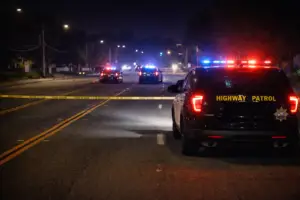In Defense of the Anonymous Pen
Not too long ago, I was told (or lectured)—publicly in a Facebook post—that because I didn’t attach a name and a smiling face to the reporting I was doing, that I must not be a “real journalist.” That unless I stood in front of the story, instead of behind it, I was doing something wrong.
The source of this opinion? A long-standing local journalist. Or at least that’s the title he gave himself. In reality, a part-time sports correspondent for a local high school, with two decades of covering football games and subbing in classrooms, and part time event security. He took the time to admonish me, lecturing me on the rules of journalism — insisting that anonymity is improper, and that only named, visible reporters are to be taken seriously. That the only valid stories come from public authors willing to shout “look at me” louder than “look at this.”
And to that I say: Respectfully, no.
There’s a long-standing tradition—one older than your varsity pass or printed football recap—that honors anonymous journalism. Whistleblowers. Observers. Investigators. Writers who stepped back from the spotlight so the story could step forward. If anything, removing your name from your work often takes more courage, not less. You don’t do it to hide. You do it to survive, to protect the story, or to avoid retaliation in a system that loves the sound of silence.
Let’s take a walk through history, since apparently some folks skipped that part of Journalism 101:
- Nellie Bly: One of the most courageous investigative journalists of all time. Born Elizabeth Cochran Seaman, she used a pen name to expose injustice and abuse—including faking insanity to report from inside a mental asylum in 1887. If anonymity invalidated truth, we’d never have known what she uncovered.
- Silence Dogood: Benjamin Franklin’s early pseudonym. At 16, he knew his words would not be accepted under his real name, so he wrote anonymously—critiquing politics, religion, and power with the pen of a woman who didn’t exist.
- The Federalist Papers: You want founding American tradition? They were published anonymously under “Publius” to rally support for the U.S. Constitution. Should we discredit that too, Husband of Eve?
- Deep Throat: The most famous anonymous source in modern history. Without him, there would have been no Watergate exposé. No resignation. No truth.
- Ida B. Wells, Fannie Fern, Currer Bell (Charlotte Brontë), and George Eliot—all women, all writers, all using pseudonyms or anonymity to have their words taken seriously in a world that otherwise would not have allowed them the ink.
These weren’t gossip columnists. They weren’t sensationalists. They were truth-tellers—doing the hard work of uncovering what people wanted buried.
And today? Not much has changed.
There are countless investigative reporters, whistleblowers, and independent journalists still working under pseudonyms or in anonymity. Think of:
- “Reality Winner” — leaked NSA documents.
- “Primary Sources” on Reddit and Substack reporting war crimes and governmental abuse.
- Undercover journalists who infiltrate labor camps, extremist groups, or corruption rings.
The International Consortium of Investigative Journalists (ICIJ) still protects the identities of many of its sources. Why? Because sometimes the truth is dangerous. And when that’s the case, it’s the story that matters—not the signature.
So to those who say, “You can’t be a real journalist unless we know your name,” I say this: You’re confusing exposure with integrity. And you’ve mistaken performance for bravery.
As this all unfolds, I’ve been told — quite pointedly — that I “shouldn’t be hiding behind a website.” That transparency means attaching a name, a face, a résumé.
The person who told me that, ‘seasoned’ and says they’ve been in journalism for 25 years. And maybe they have. But when I searched, all I found was a single sports article credited to their name…from ONE local high school sporting event. Maybe their work predates digital records and Google. Maybe they’ve been writing all this time and just haven’t been published. That’s not for me to judge.
What I can say is this: history is on my side.
Anonymity in journalism isn’t new, and it isn’t cowardice. It’s been a shield, a tool, and a tradition — from Silence Dogood to Publius, Nellie Bly to Deep Throat. Writers have long stepped back from the spotlight to make room for the story itself. And I’d rather follow in those footsteps than chase validation from someone who thinks journalism starts and ends with a byline.
And maybe — just maybe — part of the discomfort isn’t really about journalistic ethics. Maybe it’s about watching someone new do the work faster, louder, and with more traction than expected. Maybe it’s uncomfortable to realize that the story moved forward without the old gatekeepers. That it didn’t wait for permission.
I didn’t set out to compete. I set out to report. But if what I’m building unsettles people who’ve been sitting in the same chair for 25 years — maybe it’s not the method that’s threatening. Maybe it’s the momentum.
So if a name is what you need — if credentials come down to having something to call me — then fine. You can call me Lizzie Bly. Call me every mother, every neighbor, every parent watching from the sidelines, tired of silence. I’m not here to be the story. I’m here to tell it.
If you want sports coverage, the stadium’s that way.
If you want truth, stay tuned.
-Lizzie Bly
Editor, East of 52




